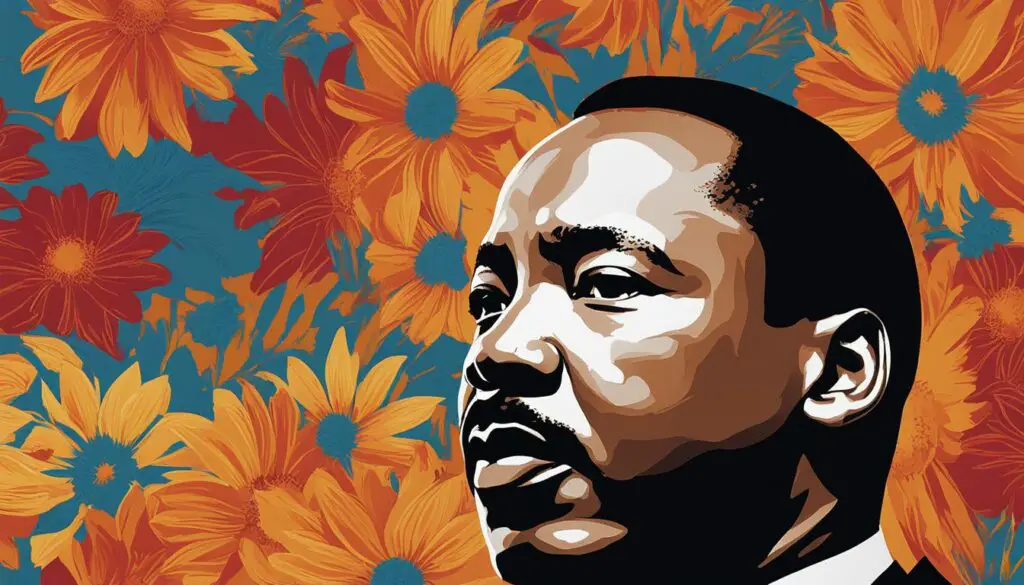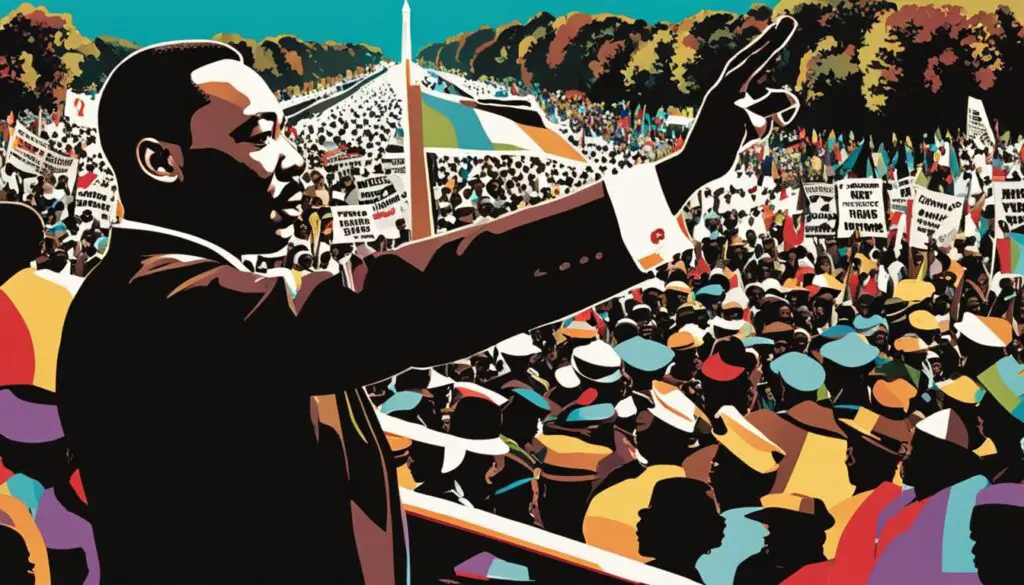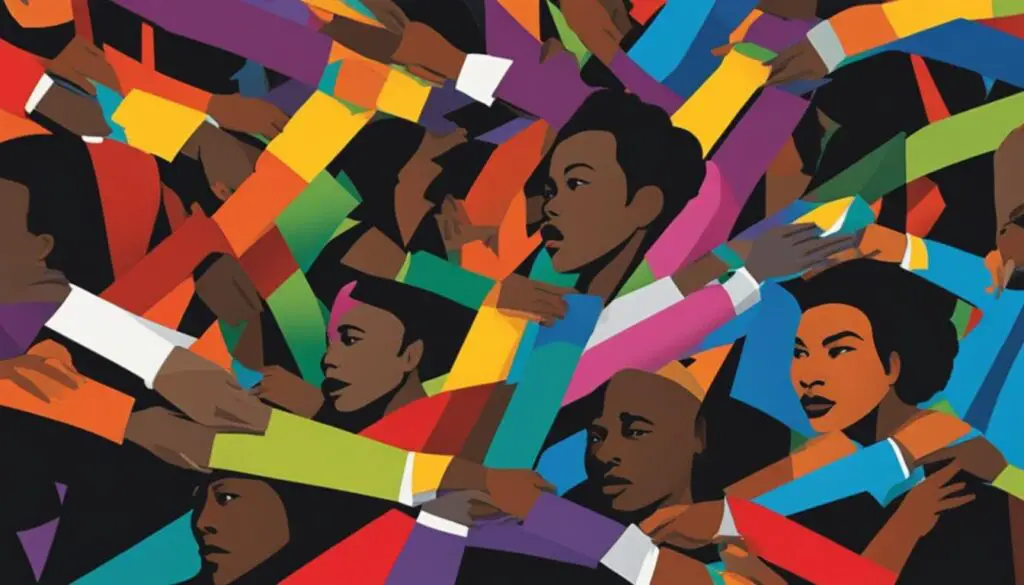Martin Luther King Jr. is widely recognized as one of the greatest civil rights activists in American history. His unwavering dedication to the fight for racial equality and justice left a profound impact on society and continues to inspire millions today. King’s biography is a testament to the power of conviction, compassion, and nonviolent resistance in the pursuit of a better world.
Born on January 15, 1929, in Atlanta, Georgia, Martin Luther King Jr. grew up surrounded by racial segregation and witnessed firsthand the injustices faced by African Americans. Inspired by his father, Daddy King, who fought against segregation laws, King developed a deep-rooted determination to challenge and dismantle systemic discrimination.
Throughout his life, Martin Luther King Jr. delivered powerful speeches that resonated with people of all backgrounds. His moving words continue to echo in our collective conscience, reminding us of the urgent need for equality and justice for all. One of his most famous quotes states, “I have a dream that my four little children will one day live in a nation where they will not be judged by the color of their skin but by the content of their character.”
Martin Luther King Jr.’s accomplishments are immeasurable. He played a pivotal role in the civil rights movement, leading peaceful protests and advocating for racial desegregation. His leadership was instrumental in significant milestones such as the Montgomery Bus Boycott, which ultimately led to the desegregation of buses in Montgomery, Alabama. King’s tireless efforts also contributed to the passage of the Civil Rights Act of 1964 and the Voting Rights Act of 1965, forever changing the landscape of civil rights in America.
Despite facing immense challenges and opposition, King remained steadfast in his pursuit of justice and equality. He endured acts of violence, including bombings and threats, and faced criticism from within and outside the civil rights movement. His resilience and unwavering commitment to nonviolent resistance inspired countless individuals to join the fight for civil rights.
Key Takeaways:
- Martin Luther King Jr. was a prominent civil rights activist who fought for racial equality and justice.
- His profound speeches and quotes continue to inspire people worldwide.
- Key achievements include leadership in the Montgomery Bus Boycott and instrumental roles in significant legislation.
- King faced challenges but remained steadfast in his commitment to nonviolent resistance.
- His legacy serves as a reminder of the ongoing work needed to achieve equality and justice for all.
Inspiration and Influences
Martin Luther King Jr. was inspired and influenced by notable figures who championed equality and justice. One of his primary sources of inspiration was his father, Daddy King, who firmly rejected segregation laws and instilled in King a deep determination to fight for racial equality. Witnessing his father’s unwavering commitment to justice had a profound impact on King’s worldview and shaped his own activism.
“I refuse to accept the view that mankind is so tragically bound to the starless midnight of racism and war that the bright daybreak of peace and brotherhood can never become a reality… I believe that unarmed truth and unconditional love will have the final word.”
Martin Luther King Jr.
In addition to his father, King drew inspiration from the teachings of Mahatma Gandhi, the revered leader of the Indian independence movement. Gandhi’s philosophy of nonviolence and his commitment to fighting oppression resonated deeply with King. Gandhi’s principles of peaceful resistance and solidarity with oppressed communities worldwide became a guiding force in King’s pursuit of social justice.
“Be the change that you wish to see in the world.”
Mahatma Gandhi
These significant influences played a pivotal role in shaping Martin Luther King Jr.’s beliefs and strategies. They instilled in him a profound belief in the power of peaceful protest, the importance of nonviolence, and the necessity of standing in solidarity with oppressed people everywhere.

Key Achievements
Martin Luther King Jr. achieved remarkable milestones in the pursuit of civil rights and equality in the United States. His leadership and activism left an indelible impact on society, transforming the landscape of racial equality and civil rights.
One of King’s key achievements was his instrumental role in the Montgomery Bus Boycott. After the arrest of Rosa Parks for refusing to give up her seat to a white passenger, King emerged as a leader in organizing peaceful protests and advocating for the desegregation of buses. The boycott, which lasted for 381 days, led to the eventual desegregation of public transportation in Montgomery, Alabama.
Another noteworthy accomplishment of Martin Luther King Jr. was his pivotal involvement in the March on Washington for Jobs and Freedom. It was during this historic event that King delivered his iconic “I Have a Dream” speech, capturing the hearts and minds of millions and envisioning a future where racial injustice would be eradicated. His powerful words emphasized the importance of equality, justice, and unity among all Americans.

Furthermore, King’s leadership was central to the passage of significant legislation in the fight for civil rights. The Civil Rights Act of 1964, which outlawed discrimination based on race, color, religion, sex, or national origin, was a direct result of his activism. Similarly, the Voting Rights Act of 1965, which aimed to eliminate voting barriers for African Americans, owed much of its success to King’s advocacy and mobilization efforts.
Through these achievements, Martin Luther King Jr. contributed to the advancement of racial equality and civil rights in the United States. His unwavering dedication, strategic leadership, and ability to inspire change laid the foundation for a more inclusive and just society.
Martin Luther King Jr.’s Key Achievements
| Achievement | Description |
|---|---|
| Leadership in the Montgomery Bus Boycott | Instrumental role in organizing protests and advocating for the desegregation of buses in Montgomery |
| March on Washington for Jobs and Freedom | Delivery of the iconic “I Have a Dream” speech, calling for an end to racial injustice |
| Passage of the Civil Rights Act of 1964 | Contributed to the outlawing of discrimination based on race, color, religion, sex, or national origin |
| Passage of the Voting Rights Act of 1965 | Advocated for the elimination of voting barriers for African Americans |
Overcoming Challenges
Martin Luther King Jr. faced numerous challenges and obstacles throughout his life, as he fought tirelessly for equality and justice. Despite the immense pressure and adversity, King remained unwavering in his commitment to the civil rights movement.
One of the challenges King encountered was the constant threat of violence. He and his family faced bombings, threats, and acts of intimidation, aimed at silencing their voices and derailing their mission. Throughout it all, King displayed remarkable courage and resilience, refusing to be intimidated or deterred.
King also experienced arrests and imprisonment for his activism. He was often targeted by authorities who sought to undermine his efforts. However, even behind bars, King continued his fight, using his time in confinement to reflect, strategize, and inspire others.
In addition to external opposition, King faced criticism and opposition from within the civil rights movement itself. Some members disagreed with his nonviolent tactics and preferred more militant approaches. Despite the disagreements, King persisted, convinced that nonviolence was the most effective means of achieving lasting social change.
Through all the challenges, King’s determination and resilience shone through. He defied the odds and remained steadfast in his pursuit of justice and equality.
Core Values and Principles
Martin Luther King Jr.’s core values were deeply rooted in his unwavering belief in equality, justice, and nonviolence. He dedicated his life to fighting for the rights and equal treatment of all individuals, regardless of their race. King firmly believed that every person deserved equal opportunities and rights, challenging the prevalent racial discrimination of his time.
One of King’s core principles was the urgent need to address economic inequality. He recognized that the struggle for civil rights went hand in hand with addressing the systemic barriers that perpetuated economic disparities, as African Americans faced limited access to quality education, employment opportunities, and fair wages. King advocated for a comprehensive approach that encompassed economic and social justice, viewing the civil rights movement as part of a broader social democratic movement.
King’s principles were deeply influenced by his faith and his vision of a just society. He drew inspiration from his Christian beliefs, which emphasized the power of love, compassion, and forgiveness. Through his speeches and actions, King exemplified the transformative potential of nonviolent protest. He viewed nonviolence not simply as a tactic, but as a way of life rooted in the understanding that love and empathy are powerful tools for bringing about lasting change.
“Darkness cannot drive out darkness; only light can do that. Hate cannot drive out hate; only love can do that.”
This quote from King’s book, “Strength to Love,” encapsulates his core values and principles. He believed that love and understanding were essential in breaking the cycle of hate and discrimination. King’s commitment to nonviolence and his belief in the power of peaceful protest continue to inspire generations of activists seeking social change.
By adhering to his core values and principles, Martin Luther King Jr. became a beacon of hope and a symbol of resilience and determination. His unwavering pursuit of justice and equality not only transformed American society but also inspired movements around the world. King’s legacy serves as a reminder that the fight for civil rights and social justice requires a commitment to love, compassion, and nonviolence.

Legacy
Martin Luther King Jr.’s legacy is profound and enduring. His leadership and advocacy continue to inspire generations of activists fighting for social justice and equality.
The values and principles he championed are still relevant today. King’s legacy includes the significant progress made in civil rights and racial equality, as well as his impact on shaping public discourse and consciousness around issues of race, economic inequality, and social justice.

His legacy serves as a reminder of the ongoing work needed to achieve his dream of equality for all.
Lessons for Today
Martin Luther King Jr.’s example provides valuable lessons for today. His commitment to nonviolence, his ability to mobilize and galvanize people, and his unwavering determination to fight for justice and equality are lessons that can be applied to current struggles for social change. King’s emphasis on the importance of love, compassion, and understanding in bringing about lasting change serves as a reminder of the power of peaceful protest and the need for empathy and unity in the face of division and injustice.
“Darkness cannot drive out darkness; only light can do that. Hate cannot drive out hate; only love can do that.”
Martin Luther King Jr.’s firm belief in the transformative power of love and nonviolence serves as an important lesson for today. In a world filled with division and conflict, King’s message reminds us of the need to approach social issues with empathy, compassion, and a commitment to understanding. By embracing love and peace instead of hate and violence, we can strive to create a more just and equal society for all.
King’s ability to inspire and mobilize people is another crucial lesson for today’s activists. Through his powerful speeches and leadership, he was able to unite diverse individuals under a common goal of creating a better future. His example reminds us of the importance of effective communication and the power of shared values in driving social change.

Early Life and Education
Martin Luther King Jr. was born in Atlanta, Georgia, into a middle-class family. His father was a prominent minister who instilled in him a strong sense of faith and social responsibility. His mother, a teacher, nurtured his intellectual curiosity and love for learning.
King excelled academically and graduated from Booker T. Washington High School at the age of 15. He went on to attend Morehouse College, where he studied sociology and was exposed to influential thinkers and the philosophies that would shape his future activism. It was during his time at Morehouse that King’s understanding of racial inequality deepened, inspiring him to take action and fight for justice.
After completing his undergraduate studies, King pursued higher education at Crozer Theological Seminary in Pennsylvania. There, he studied theology and honed his skills as a public speaker and preacher. His education at Crozer expanded his perspectives and exposed him to a diverse range of ideas and beliefs.
In pursuit of further academic advancement, King then enrolled in Boston University’s School of Theology, where he earned his Ph.D. in theology. His doctoral dissertation, “A Comparison of the Conceptions of God in the Thinking of Paul Tillich and Henry Nelson Wieman,” showcased his intellectual depth and commitment to blending theological principles with the pursuit of social justice.
King’s education played a crucial role in shaping his understanding of the world and fueled his commitment to fighting against racial injustice and inequality. It provided him with the knowledge, skills, and critical thinking abilities that would become instrumental in his leadership within the civil rights movement.
The Montgomery Bus Boycott
The Montgomery Bus Boycott was a defining moment in the civil rights movement, and Martin Luther King Jr. played a crucial role in its success. The boycott was sparked by the arrest of Rosa Parks, a black woman who refused to give up her seat to a white passenger on a segregated bus. This act of defiance ignited a wave of protests and resistance against racial segregation in public transportation.
As a young minister, Martin Luther King Jr. emerged as a prominent leader during the boycott. He recognized the potential of the Montgomery Bus Boycott to bring about significant change and dedicated himself to organizing peaceful protests and advocating for desegregation of public transportation. King’s eloquent speeches and powerful words resonated with the African American community, inspiring them to stand up against injustice.
For 381 days, the Montgomery Bus Boycott continued, with African Americans refusing to ride the buses in Montgomery. Despite facing immense pressure and adversity, King remained steadfast in his commitment to nonviolence and civil rights. He urged people to become active participants in the boycott and to embrace love and unity in the face of hatred and discrimination.
The impact of the Montgomery Bus Boycott was undeniable. It caught the attention of the nation and the world, shedding light on the injustices faced by African Americans on a daily basis. The boycott ultimately led to a Supreme Court ruling in 1956, declaring racial segregation on public buses unconstitutional.
“The Montgomery Bus Boycott was an inspiring display of collective resilience and determination. It showed the power of nonviolent resistance and laid the foundation for future civil rights victories.” – Martin Luther King Jr.
Through his involvement in the Montgomery Bus Boycott, Martin Luther King Jr. demonstrated his leadership skills, strategic thinking, and unwavering dedication to fighting for equality and justice. This pivotal moment in history shaped King’s role in the civil rights movement and paved the way for his future activism to come.
The March on Washington and “I Have a Dream” Speech
The March on Washington for Jobs and Freedom, held on August 28, 1963, was a historic event in the civil rights movement. It united hundreds of thousands of people in support of civil rights and equality, showcasing the power of collective action. At the heart of this momentous occasion was Martin Luther King Jr., a visionary leader who delivered his iconic “I Have a Dream” speech, which continues to inspire and resonate today.
In his powerful speech, King passionately called for an end to racial injustice and discrimination, envisioning a future where individuals would be judged not by the color of their skin but by the content of their character. With eloquence and conviction, he expressed his dream of a nation that would rise above prejudice and embrace equality for all.
“I have a dream that my four little children will one day live in a nation where they will not be judged by the color of their skin but by the content of their character.”
The impact of King’s speech cannot be overstated. It became one of the most famous and influential speeches in American history, serving as a catalyst for change and inspiring generations of activists. The March on Washington and King’s “I Have a Dream” speech elevated the civil rights movement to new heights, galvanizing support and mobilizing individuals from all walks of life.
Through his words, Martin Luther King Jr. articulated the hopes and dreams of millions, reinforcing the fundamental principles of equality, justice, and human rights. His speech gave voice to the aspirations of a nation, igniting a fire within the hearts of those fighting for a more just and inclusive society.
Conclusion
Martin Luther King Jr., a transformative figure in the civil rights movement, has left a lasting legacy that continues to inspire and resonate today. His unwavering commitment to equality and justice serves as a powerful reminder of the progress that has been made in the fight for civil rights. King’s accomplishments, values, and principles have had a profound impact on society, shaping the understanding of the importance of equal rights and opportunities for all.
Despite facing numerous challenges and obstacles, King persisted in his mission, leading by example and inspiring millions of people to join the fight for social change. His dream of a just and equal society has become a guiding light for generations of activists who continue the work he started.
Throughout his life, Martin Luther King Jr. embodied core values and principles such as nonviolence, compassion, and the belief in the power of love to bring about lasting change. His leadership and advocacy have significantly contributed to the progress made in civil rights, but his legacy goes beyond that. King’s impact can be seen in shaping public discourse, consciousness, and the ongoing efforts to address issues of racial inequality, economic disparity, and social justice.
Today, we can learn valuable lessons from Martin Luther King Jr.’s example. His unwavering dedication, his ability to mobilize people, and his emphasis on nonviolent protest continue to serve as a blueprint for activists fighting for equality. King’s legacy compels us to confront the remaining challenges and work towards building a more just and inclusive society.
FAQ
Was Martin Luther King Jr. only known for fighting for racial equality?
No, Martin Luther King Jr. also advocated for a society that judged individuals by the content of their character rather than the color of their skin. He fought against poverty wages and addressed issues of the economy, education, and war and peace.
What were Martin Luther King Jr.’s key achievements?
Martin Luther King Jr.’s key achievements include his leadership in the civil rights movement, his role in the desegregation of American neighborhoods, his instrumental role in the passage of the Civil Rights Act of 1964 and the Voting Rights Act of 1965, and his iconic “I Have a Dream” speech.
What challenges did Martin Luther King Jr. face?
Martin Luther King Jr. faced acts of violence, including bombings and threats, as well as arrests and imprisonment. He also faced criticism and opposition from both white supremacists and some members of the civil rights movement who disagreed with his tactics.
What were Martin Luther King Jr.’s core values?
Martin Luther King Jr.’s core values were rooted in his belief in equality, justice, and nonviolence. He advocated for the need to address economic inequality and viewed the civil rights movement as part of a broader social democratic movement.
What is Martin Luther King Jr.’s legacy?
Martin Luther King Jr.’s legacy is profound and enduring. His leadership and advocacy continue to inspire generations of activists fighting for social justice and equality. His impact on civil rights and racial equality, as well as his influence on public discourse and consciousness around issues of race, economic inequality, and social justice, are part of his lasting legacy.
What lessons can we learn from Martin Luther King Jr. today?
We can learn lessons of commitment to nonviolence, the power of peaceful protest, and the importance of love, compassion, and empathy in bringing about lasting change. We can also learn from his ability to mobilize and galvanize people and his unwavering determination to fight for justice and equality.
What was Martin Luther King Jr.’s early life and education like?
Martin Luther King Jr. was born in Atlanta, Georgia, to a prominent minister father and a teacher mother. He grew up in a middle-class family and received a solid education. He excelled academically and attended Morehouse College and later pursued graduate studies at Boston University, where he earned a Ph.D. in theology.
What was the Montgomery Bus Boycott, and what was Martin Luther King Jr.’s role?
The Montgomery Bus Boycott was a pivotal moment in the civil rights movement, sparked by the arrest of Rosa Parks for refusing to give up her seat on a segregated bus. Martin Luther King Jr. emerged as a leader during the boycott, organizing peaceful protests and advocating for desegregation. The boycott ultimately led to a Supreme Court ruling declaring segregation on buses unconstitutional.
What was the March on Washington, and what was Martin Luther King Jr.’s speech?
The March on Washington for Jobs and Freedom was a historic event in the civil rights movement, during which hundreds of thousands of people gathered in support of civil rights and equality. Martin Luther King Jr. delivered his iconic “I Have a Dream” speech, calling for an end to racial injustice and envisioning a future where individuals would be judged by their character rather than their skin color.
Why is Martin Luther King Jr.’s legacy important?
Martin Luther King Jr.’s legacy is important because he brought about significant progress in the fight for civil rights and racial equality. His work and advocacy continue to inspire and resonate today, serving as a reminder of the ongoing work needed to achieve equality for all.

